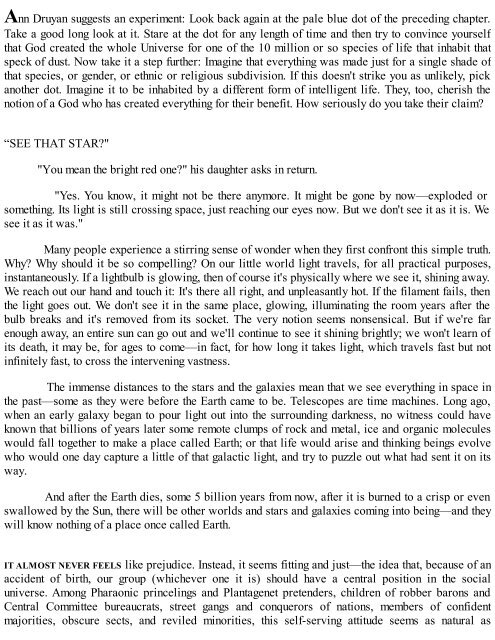Pale Blue Dot ( PDFDrive.com ) (1)
Create successful ePaper yourself
Turn your PDF publications into a flip-book with our unique Google optimized e-Paper software.
Ann Druyan suggests an experiment: Look back again at the pale blue dot of the preceding chapter.<br />
Take a good long look at it. Stare at the dot for any length of time and then try to convince yourself<br />
that God created the whole Universe for one of the 10 million or so species of life that inhabit that<br />
speck of dust. Now take it a step further: Imagine that everything was made just for a single shade of<br />
that species, or gender, or ethnic or religious subdivision. If this doesn't strike you as unlikely, pick<br />
another dot. Imagine it to be inhabited by a different form of intelligent life. They, too, cherish the<br />
notion of a God who has created everything for their benefit. How seriously do you take their claim?<br />
“SEE THAT STAR?"<br />
"You mean the bright red one?" his daughter asks in return.<br />
"Yes. You know, it might not be there anymore. It might be gone by now—exploded or<br />
something. Its light is still crossing space, just reaching our eyes now. But we don't see it as it is. We<br />
see it as it was."<br />
Many people experience a stirring sense of wonder when they first confront this simple truth.<br />
Why? Why should it be so <strong>com</strong>pelling? On our little world light travels, for all practical purposes,<br />
instantaneously. If a lightbulb is glowing, then of course it's physically where we see it, shining away.<br />
We reach out our hand and touch it: It's there all right, and unpleasantly hot. If the filament fails, then<br />
the light goes out. We don't see it in the same place, glowing, illuminating the room years after the<br />
bulb breaks and it's removed from its socket. The very notion seems nonsensical. But if we're far<br />
enough away, an entire sun can go out and we'll continue to see it shining brightly; we won't learn of<br />
its death, it may be, for ages to <strong>com</strong>e—in fact, for how long it takes light, which travels fast but not<br />
infinitely fast, to cross the intervening vastness.<br />
The immense distances to the stars and the galaxies mean that we see everything in space in<br />
the past—some as they were before the Earth came to be. Telescopes are time machines. Long ago,<br />
when an early galaxy began to pour light out into the surrounding darkness, no witness could have<br />
known that billions of years later some remote clumps of rock and metal, ice and organic molecules<br />
would fall together to make a place called Earth; or that life would arise and thinking beings evolve<br />
who would one day capture a little of that galactic light, and try to puzzle out what had sent it on its<br />
way.<br />
And after the Earth dies, some 5 billion years from now, after it is burned to a crisp or even<br />
swallowed by the Sun, there will be other worlds and stars and galaxies <strong>com</strong>ing into being—and they<br />
will know nothing of a place once called Earth.<br />
IT ALMOST NEVER FEELS like prejudice. Instead, it seems fitting and just—the idea that, because of an<br />
accident of birth, our group (whichever one it is) should have a central position in the social<br />
universe. Among Pharaonic princelings and Plantagenet pretenders, children of robber barons and<br />
Central Committee bureaucrats, street gangs and conquerors of nations, members of confident<br />
majorities, obscure sects, and reviled minorities, this self-serving attitude seems as natural as


